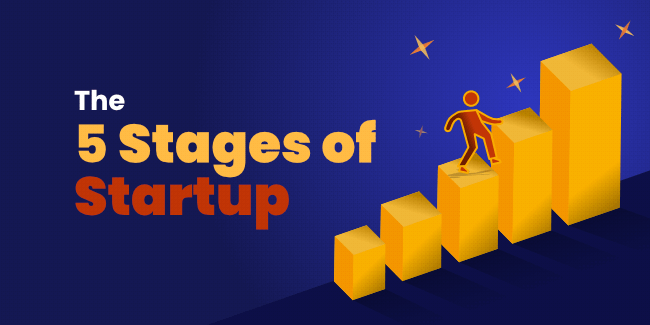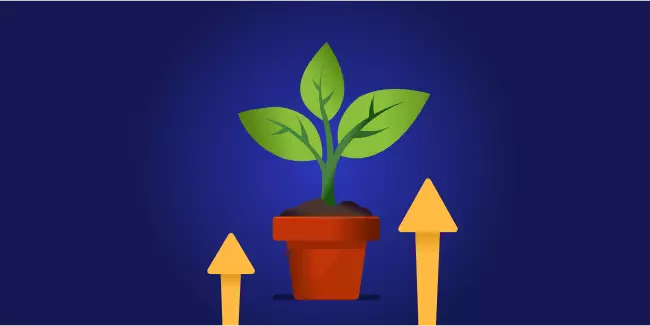The 5 Stages of Startup

You may have the next brilliant idea that could transform into a booming startup akin to Airbnb, Uber, or Instagram. However, before you start referring to yourself as the next-day Mark Zuckerberg and envisioning your success story unfolding in front of you, it is essential to know that there is more than just a great concept needed for success with startups - after all, 90% of them fail.
Are you interested in joining the exclusive 10% of successful startups? To do so, it is essential to understand and meet the expectations for your startup at any stage, from idea validation to exit.
At what point should you launch your product? Is it market-ready now, or could it use more fine-tuning? When does scaling come into play, and when is the right time to approach investors? Being conscious of the different startup stages and their respective goals will help ensure your startup succeeds.
When it comes to startup development, there are numerous strategies you can pursue. A classic approach breaks down the process into three development lifecycle stages: early venture, series A, and growth. Every early-stage startup entails various tasks that need to be completed for your business to reach its full potential.
The Idea Stage

Idea stage - the first startup stage of a business begins with evaluating and exploring your idea. Extending your initial proposal is essential while gauging how potential customers will view the concept during this stage. Additionally, ensure that you have found a problem/solution fit before moving on to subsequent steps in starting your venture.
Every successful startup was created with an aim, and surveying your business hypotheses before seed financing is elemental. Tragically, 42% of businesses are unsuccessful due to a lack of interest in their items or services. To ensure success and avoid joining this statistic yourself, be sure there is a demand for your product on the market! Performing research before launching is essential if you wish to bypass the fate of 90% of failed startups.
At the initial Idea stage, you can gain insight into your startup's odds of success or failure by considering existing issues and rivals. This phase serves as the groundwork for your business; take advantage of this opportunity to ensure you set realistic goals and expectations! Additionally, evaluate how practical it is to launch a new product/service.
Aspiring entrepreneurs should be equipped to answer these essential questions before taking the next step in their journey:
- Is my solution pertinent to a genuine issue?
- Is my solution comparable to any solutions currently on the market?
- Which types of customers have the most potential to benefit from my services?
- What similar products or services are they already utilizing?
- What sets my product/service apart from the competition?
- What elements matter most to your customers?
Getting feedback on your startup and ideas is essential if they have potential. The best way to understand what customers seek is by asking them directly through interviews. It allows you to accurately identify their wants, needs, and willingness to pay to ensure your endeavor's success!
Investing your time in customer interviews is a surefire way to reap the rewards of success. By relying on feedback from those who will use your product, you can more accurately create go-to-market strategy products that meet their needs rather than taking a guess. Plus, those interview results would be invaluable information when crafting a persuasive pitch deck - take your time with failure! 14% of startups fail due to neglecting customers' wants and needs, so notice this essential step!
Gathering the necessary resources for market research can take time and effort. With a hint of potential success, it may seem possible to acquire such funds - this is where 'friends and family rounds come in handy during the initial startup development stage! Through these investments, you can access the vital financial resources required while allowing your product to become successful.
To prevent potential distress later on, it's best to tackle any necessary copyright agreements or other legal issues immediately. Be mindful - procrastinating addressing such matters will inevitably lead to expensive and complex surprises!
The Seed Stage

After meticulously examining and crafting the essentials for your startup, it's time to take action and bring your business idea to life.
Investopedia summarizes the seed-stage startups concisely and accurately:
"You can think of the 'seed' funding as part of an analogy for planting a tree. This early financial support is ideally the 'seed' to help grow the business. Given enough revenue, a successful business strategy, as well as the perseverance and dedication of investors, the company will hopefully grow eventually into a 'tree.'
This stage marks the commencement of equity investment for your startup, a step that is essential to success. Despite having an idea that could revolutionize your industry, it will only fall through with adequate funding. More money or difficulty in obtaining new capital is one of the predominant factors why startups fail, with 38% unable to weather financial struggles.
You have built a minimum viable product (MVP), and now it's time to develop your startup so that you can launch it onto the market. Financial investment is required for marketing initiatives, recruiting personnel to fill critical positions, and conducting extra market research to perfect your products' long-term success. This phase of growth will be instrumental in bringing your idea into reality! A Minimum Viable Product (MVP) is a must-have set of features that allows you to test the product with your target audience without any sophisticated engineering.
Now is the time to consider insurance policies enabling you to take risks and give your business a chance to thrive. Utilizing an insurance policy as a risk transfer can make your startup even more appealing to potential investors, helping ensure that it continues on its secure growth path. Remember that workers' compensation coverage is mandatory once you start hiring employees.
Capital is essential for the seed stage, so look beyond your family and friends. Incubators, crowdfunding platforms, and angel investors are all potential funding sources. Since they take a significant risk by investing in startups at this development point, expect they'll seek equity in exchange for their funds. To give you an idea of what other companies usually raise during this phase: In 2022, the median seed round investment was $1 million, with a pre-money valuation estimated at around $6 million.
The Series A Stage
Series A is a term that has become synonymous with the startup world due to its significance. It symbolizes an impressive accomplishment for your business, representing its first round of venture capital financing.
Now that you have developed your product, built a consumer base, and brought in revenue, this early stage is the ideal moment to transition into Series A funding. It is where venture capitalists invest their money in your company for the first time. With this extra budgeting comes new opportunities to expand and optimize what you already offer!
During Series A of a business, it is vital to have an effective plan established for long-term profitability. Often entrepreneurs come up with great ideas that ignite enthusiasm early on. However, they fail to devise strategies to bring in money over time, and their concept fizzles. Before connecting with investors, familiarize yourself with fundraising tactics and perfect your pitch deck so you can present yourself professionally.
Remember that potential investors are not interested only in a great idea. They also want to hear about your startup's viable business plan for profitability and the return on investment, which is understandable given that Series A investments have sky-rocketed over recent years - reaching an average of $13 million by 2022. Pre-money valuation for such startups has climbed to a median value of $24 million.
When the first advantages arrive, it's time to introduce a business model. At this stage, you'll need additional financial support to keep pushing forward, which can come from various investors who specialize in companies of your particular life cycle phase.
When your financial contributions have taken off at this crucial stage, it's essential to prioritize obtaining additional insurance coverage. It is particularly true with institutional investors such as venture capital firms, who usually require that you acquire a directors and officers (D&O) insurance policy before they commit funds. So don't forget – get the proper protection to close the deal!
Let's face it: this phase is not a walk in the park. The truth is that only 7.5% of startups with successful seed funding can secure Series A financing. Although it takes dedication and hard work, if your venture succeeds during this stage, you'll be in an enviable position for future prosperity and expansion!
The Growth Stage

Congratulations on having achieved the growth stage! After a tumultuous period of highs and lows in your business's beginning days, you have emerged victorious. You've shown that there's an existing market demand for what your company offers; it's time to shoot higher by scaling operations further.
After obtaining Series A funding, your company enters the growth stage and will acquire Series B and C investments. At this point, the business has risen beyond its potential with a proven capability to surpass projected objectives while bringing in revenue. As of 2022, the median pre-money valuation for Series B startups was $40 million. It catapulted to $68 million for those undergoing Series C financing.
It is no secret that scaling can sometimes be a difficult journey. However, being prepared to make changes will help you prevent potential disasters and take advantage of opportunities. Make sure not to hurry into scaling too soon - Startup Genome discovered that 74% of high-growth startups fail due to rushing the process.
As your company expands, remember to continually refine and develop your product or service to remain attractive to more customers. At present, investments typically stem from hedge funds, investment banks, and private equity firms.
Expanding your team beyond the critical roles and hiring specialized talent is essential to scale your operations. Now that you have both the means and a positive reputation gaining top-tier employees who will help bring success is achievable!
As a founder, you likely have been managing a variety of roles within your company. But now is the time to delegate some duties so that you can concentrate on leading and steering your organization through this crucial period. You cannot possibly be everything from CEO to CMO, HR manager to tech support all at once anymore!
The Mature Stage

Congratulations! You've succeeded with your startup and turned it into a successful business.
Undoubtedly, the present looks drastically different from when you first began your business. Nowadays, your company is widely known within its industry for success in product and service delivery to loyal customers with an accomplished team behind it - which is every founder's dream! Chances are, people no longer think of it as a startup.
As a founder, this stage presents a critical decision. You can elevate the business through new products and services, reach markets across different regions or consolidate with other firms. However, before you move ahead with your action plan, contemplate whether your organization can continue expanding and where you'll source funding. If it fits within your goals, then devise an exit strategy that aligns best with them.
Taking your startup public may be the perfect way to finance further growth. Indeed, an IPO is often seen as the endgame for many founders and startups. However, it's optional - many businesses never even reach this stage. Achieving an Initial Public Offering (IPO) involves a complex process. You'll want to evaluate the various implications of going public before deciding. Luckily, that doesn't mean all hope is lost for those choosing not to pursue an IPO; Cargill - one of America's biggest private companies with more than $134 billion in yearly revenue - is proof!
If you've invested your time, money, and skills into building a successful business but now feel the need for change, there are several valuable options to benefit from all of your hard work. Consider taking it public by launching an IPO or selling out to a larger organization with its resources and ideas. Another approach could be merging with another company, which may achieve the same results while allowing you more creative freedom.
Conclusion
Understanding that there is no definitive timeline for progressing through the different startup funding stages is essential. Many startups may never surpass seed funding, while others could take years to move past Series A. Additionally, some companies are bought before they reach later stages, and an exclusive few (the unicorns) experience massive growth, which propels them quickly forward in their journey. There truly isn't a one-size fits all approach - it's whatever will work best for your company!
No matter when your company takes the plunge, understanding the different stages of a startup's progression can help you maximize your chances of success. Awareness is critical to taking advantage of any opportunities throughout this journey. If you would like to delve further into your project, please don't hesitate to schedule a free consultation with one of our experts – at no cost!